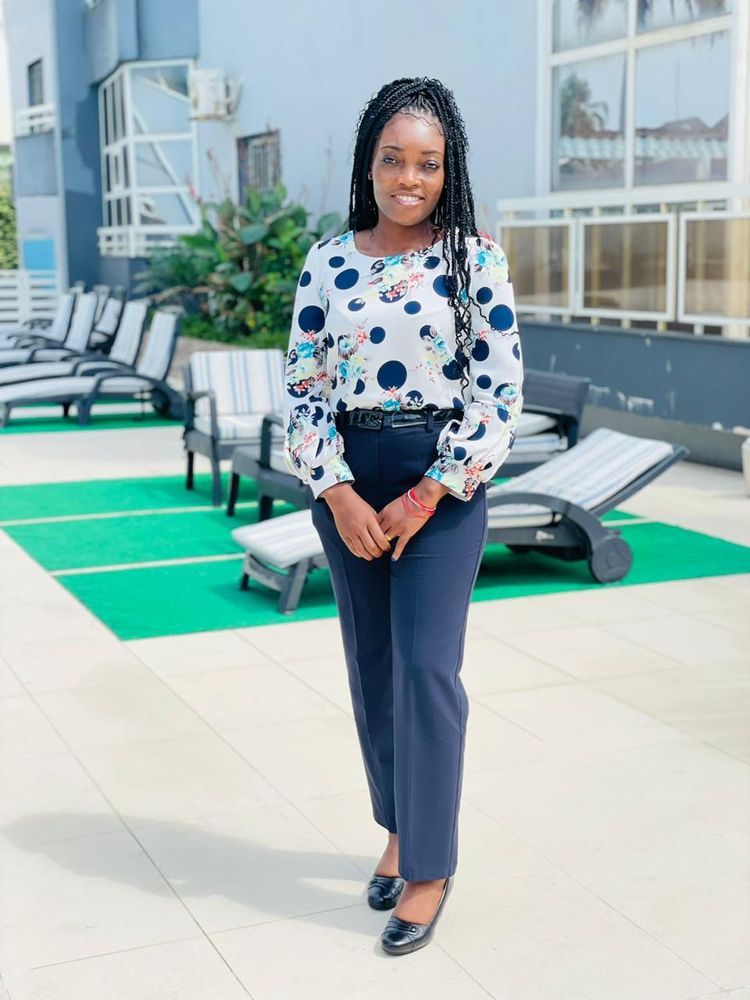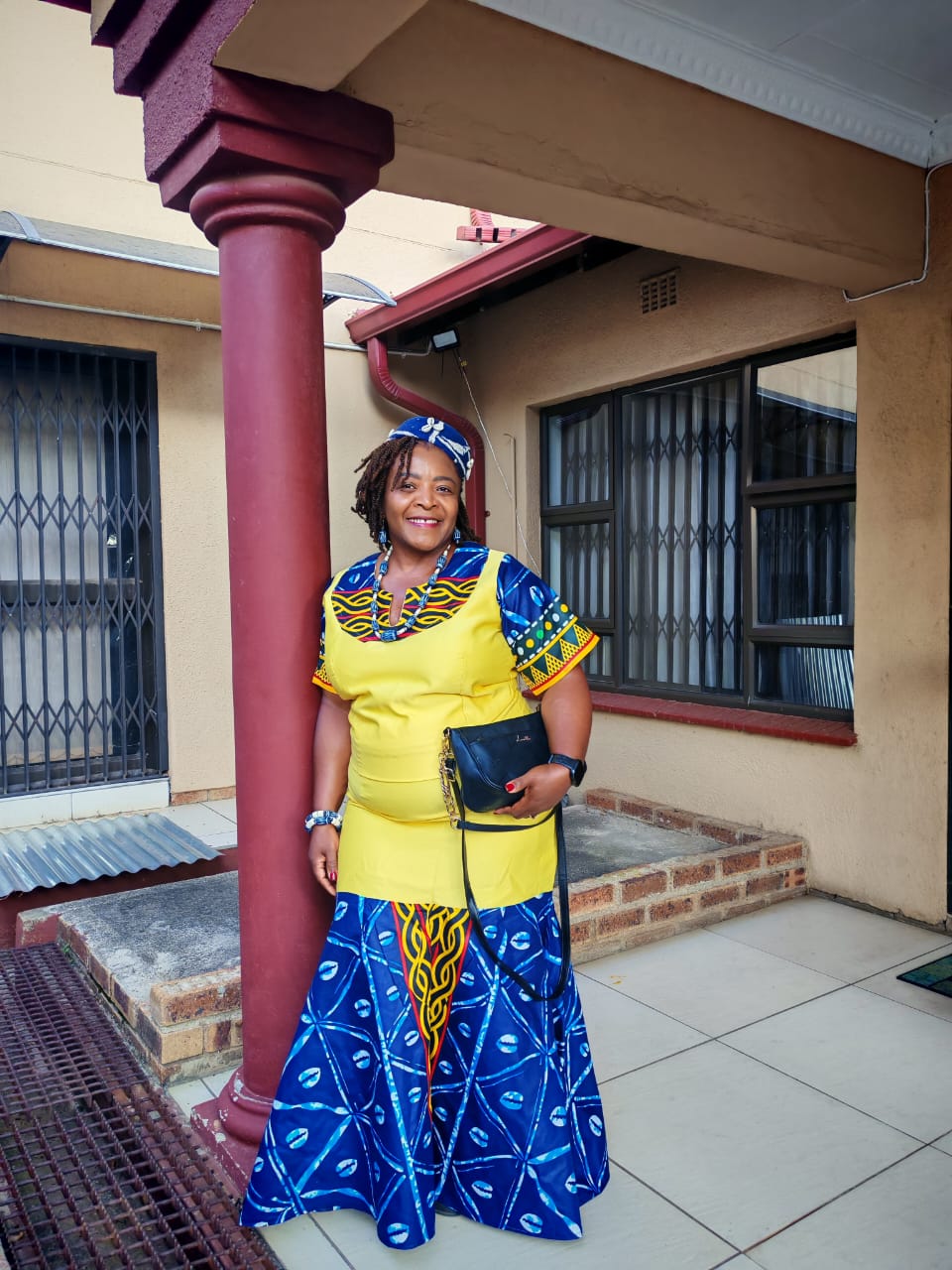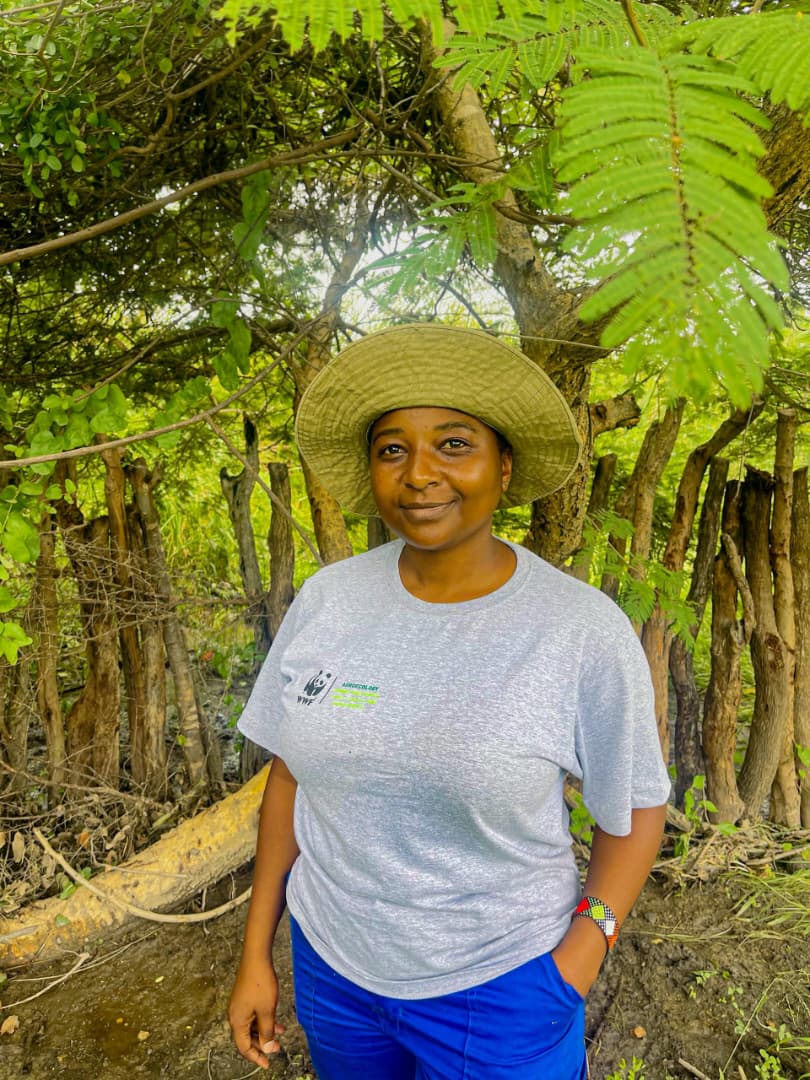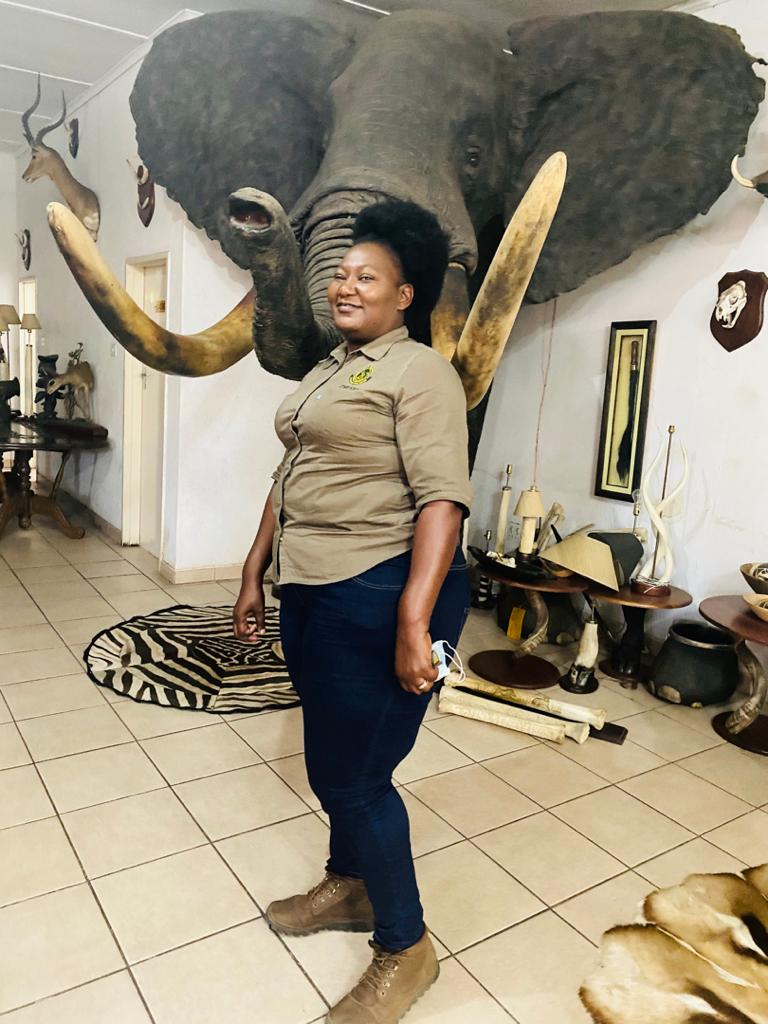This interview is part of a series profiling the stories of the 2024 WE Africa leadership programme fellows, African women in the environmental conservation sector who are showing up with a strong back, soft front, and wild heart.
***

The first time he touched her inappropriately, she froze.
Peace Quiminee was twelve, maybe thirteen.
He was a grown man; a trusted family friend who lived in her neighbourhood. Every time he came to visit, he would ask where Peace was. No one thought anything of it. Peace would go and sit beside him, and then he would casually reach for her body as if it were nothing. This happened often. And it happened because the man knew that Peace would remain silent. But deep inside the young girl, a quiet war was raging—fear, shame, confusion. Still, she said nothing to no one. Not even her mother.
Then, there was another man who owned cows in the village. Whenever he saw Peace, he would call her "my wife". At first, it annoyed her. But she soon realised it wasn’t just an irritating habit—it was a dangerous mindset. She saw how men casually referred to young girls as “my wife” as a term of endearment. It was seen as a joke that girls were supposed to laugh off. But to Peace, it was a subtle permission for men to cross boundaries that should never be crossed.
***
Growing up in Ghana, where her father is from, Peace rarely heard about sexual abuse. Not because it wasn’t happening but because speaking about it was a no-no.
“We were taught that morality was everything, that a girl’s worth was in her purity. If she was violated, she was shamed and condemned.”
The burden of ensuring this didn’t happen rested on the girls themselves. Peace remembers the warnings on the radio: "Don’t take gifts from men; you don’t know what they expect in return." "Don’t be alone with men; they might take advantage of you.
Thankfully for Peace, this message sank. She made sure never to be in a completely enclosed space with the man who touched her. Many times, he invited her to go to places with him. She never went.
She also never spoke about what he did. And she was not alone. Countless others were silenced by a culture that feared the truth more than the crime itself. Deep inside, Peace knew that one day, she would break the silence.
***
When she finally moved to Liberia, where her mother is from, she noticed a stark difference. The women there were more expressive. Conversations about gender-based violence were happening openly. Victims could seek justice without being completely ostracised. It wasn’t perfect, of course—the discrimination and stigma still existed—but compared to her earlier life in Ghana, it felt like progress.
“I grew up learning how to waive rights for the sake of peace,” she says. “If someone stepped on your toe, you were not to talk to them, you were not to argue with them. You were to remove your toe.”
And so, in Liberia, Peace had to relearn how to speak up and present her thoughts with confidence.
“I may not be exactly where I want to be, but I have gotten to a point where I am able to express myself more effectively."
***
From an early age, people noticed how Peace showed care and concern towards others. How she prioritised their well-being.
Her very name, in a sense, speaks to this. Her parents, like many others, had to flee Liberia during the civil war. They sought refuge in Ghana. Around that time, a peace accord was signed, and many children born during that period were named Peace.
“I’ve noticed that whenever I get upset or express frustration, people remind me, Hey, you need to calm down and represent your name. And in those moments, I remember—Oh, right. Peace.”
***
Growing up between two cultures—the Ghanaian one that valued quiet endurance and the Liberian one that encouraged expression—shaped Peace in complex ways. But in many ways, she is still the quiet one. “In my family, I find myself letting things go for the sake of peace. But professionally, one of my roles is to be a voice for the vulnerable, so I speak up.”
When she met her husband—then her fiancé—he pointed out that her personality aligned perfectly with social work. “You have the heart for this,” he told her. “You genuinely care about people.”
She followed his advice. But not everyone agreed with her choice.
“You are an introvert,” they’d say. “How will you have difficult conversations with people? Advocate for them?”
Rather than letting doubt hold her back, she took it as a challenge. Her job was to advocate for the needs of girls from vulnerable communities and help them become self-sufficient. To her surprise, the role came easy. The very people who once doubted her abilities were now amazed.
***
Her transition into the environmental space came from a job hunt. She had found work that required screening projects for social and ecological risks. Realising there was a skills gap, she applied for a Master's degree in environmental science.
Today, she works as a gender and safeguard manager, supporting women in accessing the benefits of natural resources. She also oversees a Gender and Environment Working Group, which brings together women in environmental fields and gender specialists from government agencies to find solutions.
Her skills in social work and the environmental space seamlessly complement each other: "I use what I learned in social work to help men see the need for supporting the environmental work I do with women," she says.
***
Having spent 13 years working on gender equality initiatives, Peace has seen firsthand how many people are triggered by the term women’s empowerment. "The moment you say ‘women deserve more opportunities’, some people hear ‘men are losing power’. But that’s not what this is about,” she says.
Interestingly, many men don’t even benefit from the same cultural norms that are assumed to favour them. Peace gives an example from Liberia where men are taught from a young age that they must always be strong. "When a man loses his wife and starts crying, he will be told, ‘Men don’t cry.’ But crying is a natural way of coping. When you take that away, what’s left?”
Then there is the burden of being the "head of the household". It isn’t always a privilege. Many men, when given the opportunity, actually welcome the idea of women contributing financially. "When we introduce projects where women support their families economically, some men say, ‘Oh, we love this! This helps us!’ So if shared responsibilities make life easier, why does resistance still exist?” Peace asks.
A lot of it comes down to misunderstanding what gender equality really means. According to Peace, some people fear that it demands an unrealistic 50/50 split in everything. She recalls cases where women, after attending empowerment workshops, return home with a sense of agency—but instead of negotiating roles, they deliver ultimatums. "A woman might tell her husband, ‘Cooking is your job too!’ in an aggressive tone. The man, feeling attacked, will say, ‘Fine, I won’t help with anything anymore.’ In the end, the woman suffers alone. That’s not what gender balance is supposed to look like."
Peace navigates these complexities by ensuring that gender equality is introduced in a way that doesn't cause division. "If we get it right, we can build a society where both men and women feel supported, and nobody has to suffer in silence."
This is one of the motivations behind her wanting to start her own NGO.
“One of my biggest concerns about development work is that many NGOs are duplicating efforts. Everywhere I look, projects overlap without real impact, and I keep asking myself: What can I do differently?”
This is her answer:
“My NGO will still emphasise women’s empowerment. But if I go to a community and assess that previous projects have already focused on women; the approach will shift to become gender-responsive. Because both men and women should have the right kind of support. But if I go to a community and find that women are still disadvantaged, then the focus will be on women."
Having seen firsthand how gender can be misunderstood, Peace wants to focus her energies on getting young people on board. "My late grandmother always used to say, If a tree has already grown tall, it is difficult to bend it in your direction. But if it’s still young, you can guide it however you wish,” she says.

***
On a personal level, Peace’s approach to life has also evolved. For one, she has learned that saying no is necessary, but more than that, it's an art. When she started doing this, she was met with mixed reactions. Men, in particular, labelled her as rude. A woman like you, saying no just like that to a man? they would say. It puzzled her—why should a woman’s refusal be seen as disrespectful?
Over time she has learned to say no with what she calls grace. And it appears to be working.
"So, I’ll say something like, I would have loved to help, but I have other commitments. With this approach, I no longer have people telling me that I am rude or frisky for asserting myself," she says.
Hand in hand with this, she has set boundaries for her wellbeing. At first, she would bring work home, and her husband’s complaints were loud: “Peace, you’re home, but you’re not really here.”
After her coaching sessions from the WE Africa program, she realised that her health and relationships needed attention, too. She started asking herself, “If I don’t do this work now, will I die?” The answer was always no. And that realisation helped her prioritise rest.
The proof is in the pudding. One affirmation of Peace’s transformation in this regard came from her husband. Unbeknownst to me, he had been listening in on parts of our conversation. After Peace and I were done talking, he chimed in:
“I am indirectly benefiting from the WE Africa program,” he said. “It has impacted our relationship in such a positive way, and I am so thankful for that.”
My final question to Peace is about the sexual abuse she experienced as a child. She had lived through painful experiences that she had kept hidden. Is she comfortable with me sharing this in her story?
“Absolutely,” she says. “If I never speak about it, I am only helping to perpetuate the very thing that hurt me. But when I share, I take power back for myself and for those who are still afraid to speak.”
And so, in sharing her story, Peace is healing herself and helping others find their paths to healing as well. In all this, she has learned that peace isn’t just about keeping the peace—it’s also about knowing when to raise your voice.
***
The following statement was written and shared by Peace Quiminee during her graduation from the WE Africa Leadership Program in December 2024:
What if I shine,
Like a star,
Penetrating the mask of the darkest night,
Bright a light of honour, honesty and embracing my authentic self
What if I shine,
And the fearful moments take their flight,
Fleeing the warmth of my glowing light,
What if I shine,
And the world turns to meet my new self,
Breaking the silence, inspired by the light they saw
What if I shine,
And the doubts within dissolve to dust,
The chains of fear unbound at last,
As courage rises, faithfully
Challenging and rewriting negative scripts
What if I shine,
Not for glory or short-lived celebrity,
But to generate a flame in every soul,
To make the broken whole, dropping keys for the needy and the oppressed
What if I shine,
And the echoes of my light remain,
A legacy stamped in the hearts of many,
So, I will shine,
For the me, my sisters, the world, and for all to see,
A light undimmed, a truth advanced,
For what if I shine, Thank you.
Peace Quiminee, WE Africa 2024 Fellow





